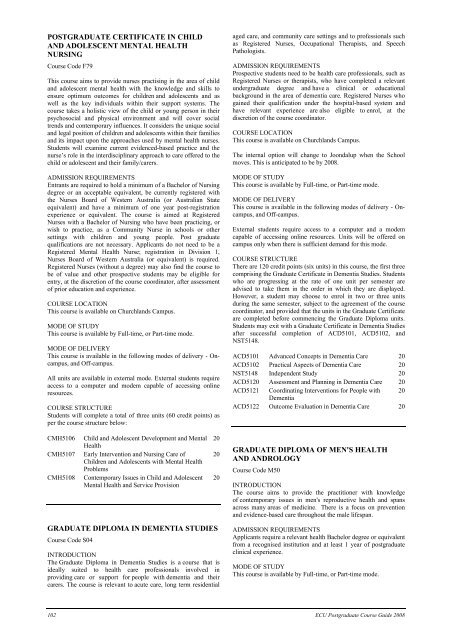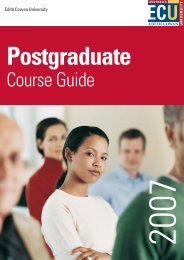Postgraduate - Edith Cowan University
Postgraduate - Edith Cowan University
Postgraduate - Edith Cowan University
Create successful ePaper yourself
Turn your PDF publications into a flip-book with our unique Google optimized e-Paper software.
POSTGRADUATE CERTIFICATE IN CHILD<br />
AND ADOLESCENT MENTAL HEALTH<br />
NURSING<br />
Course Code F79<br />
This course aims to provide nurses practising in the area of child<br />
and adolescent mental health with the knowledge and skills to<br />
ensure optimum outcomes for children and adolescents and as<br />
well as the key individuals within their support systems. The<br />
course takes a holistic view of the child or young person in their<br />
psychosocial and physical environment and will cover social<br />
trends and contemporary influences. It considers the unique social<br />
and legal position of children and adolescents within their families<br />
and its impact upon the approaches used by mental health nurses.<br />
Students will examine current evidenced-based practice and the<br />
nurse’s role in the interdisciplinary approach to care offered to the<br />
child or adolescent and their family/carers.<br />
ADMISSION REQUIREMENTS<br />
Entrants are required to hold a minimum of a Bachelor of Nursing<br />
degree or an acceptable equivalent, be currently registered with<br />
the Nurses Board of Western Australia (or Australian State<br />
equivalent) and have a minimum of one year post-registration<br />
experience or equivalent. The course is aimed at Registered<br />
Nurses with a Bachelor of Nursing who have been practicing, or<br />
wish to practice, as a Community Nurse in schools or other<br />
settings with children and young people. Post graduate<br />
qualifications are not necessary. Applicants do not need to be a<br />
Registered Mental Health Nurse; registration in Division 1,<br />
Nurses Board of Western Australia (or equivalent) is required.<br />
Registered Nurses (without a degree) may also find the course to<br />
be of value and other prospective students may be eligible for<br />
entry, at the discretion of the course coordinator, after assessment<br />
of prior education and experience.<br />
COURSE LOCATION<br />
This course is available on Churchlands Campus.<br />
MODE OF STUDY<br />
This course is available by Full-time, or Part-time mode.<br />
MODE OF DELIVERY<br />
This course is available in the following modes of delivery - Oncampus,<br />
and Off-campus.<br />
All units are available in external mode. External students require<br />
access to a computer and modem capable of accessing online<br />
resources.<br />
COURSE STRUCTURE<br />
Students will complete a total of three units (60 credit points) as<br />
per the course structure below:<br />
CMH5106 Child and Adolescent Development and Mental<br />
Health<br />
CMH5107 Early Intervention and Nursing Care of<br />
Children and Adolescents with Mental Health<br />
Problems<br />
CMH5108 Contemporary Issues in Child and Adolescent<br />
Mental Health and Service Provision<br />
GRADUATE DIPLOMA IN DEMENTIA STUDIES<br />
Course Code S04<br />
INTRODUCTION<br />
The Graduate Diploma in Dementia Studies is a course that is<br />
ideally suited to health care professionals involved in<br />
providing care or support for people with dementia and their<br />
carers. The course is relevant to acute care, long term residential<br />
20<br />
20<br />
20<br />
aged care, and community care settings and to professionals such<br />
as Registered Nurses, Occupational Therapists, and Speech<br />
Pathologists.<br />
ADMISSION REQUIREMENTS<br />
Prospective students need to be health care professionals, such as<br />
Registered Nurses or therapists, who have completed a relevant<br />
undergraduate degree and have a clinical or educational<br />
background in the area of dementia care. Registered Nurses who<br />
gained their qualification under the hospital-based system and<br />
have relevant experience are also eligible to enrol, at the<br />
discretion of the course coordinator.<br />
COURSE LOCATION<br />
This course is available on Churchlands Campus.<br />
The internal option will change to Joondalup when the School<br />
moves. This is anticipated to be by 2008.<br />
MODE OF STUDY<br />
This course is available by Full-time, or Part-time mode.<br />
MODE OF DELIVERY<br />
This course is available in the following modes of delivery - Oncampus,<br />
and Off-campus.<br />
External students require access to a computer and a modem<br />
capable of accessing online resources. Units will be offered on<br />
campus only when there is sufficient demand for this mode.<br />
COURSE STRUCTURE<br />
There are 120 credit points (six units) in this course, the first three<br />
comprising the Graduate Certificate in Dementia Studies. Students<br />
who are progressing at the rate of one unit per semester are<br />
advised to take them in the order in which they are displayed.<br />
However, a student may choose to enrol in two or three units<br />
during the same semester, subject to the agreement of the course<br />
coordinator, and provided that the units in the Graduate Certificate<br />
are completed before commencing the Graduate Diploma units.<br />
Students may exit with a Graduate Certificate in Dementia Studies<br />
after successful completion of ACD5101, ACD5102, and<br />
NST5148.<br />
ACD5101 Advanced Concepts in Dementia Care 20<br />
ACD5102 Practical Aspects of Dementia Care 20<br />
NST5148 Independent Study 20<br />
ACD5120 Assessment and Planning in Dementia Care 20<br />
ACD5121 Coordinating Interventions for People with<br />
Dementia<br />
20<br />
ACD5122 Outcome Evaluation in Dementia Care 20<br />
GRADUATE DIPLOMA OF MEN'S HEALTH<br />
AND ANDROLOGY<br />
Course Code M50<br />
INTRODUCTION<br />
The course aims to provide the practitioner with knowledge<br />
of contemporary issues in men's reproductive health and spans<br />
across many areas of medicine. There is a focus on prevention<br />
and evidence-based care throughout the male lifespan.<br />
ADMISSION REQUIREMENTS<br />
Applicants require a relevant health Bachelor degree or equivalent<br />
from a recognised institution and at least 1 year of postgraduate<br />
clinical experience.<br />
MODE OF STUDY<br />
This course is available by Full-time, or Part-time mode.<br />
102 ECU <strong>Postgraduate</strong> Course Guide 2008



